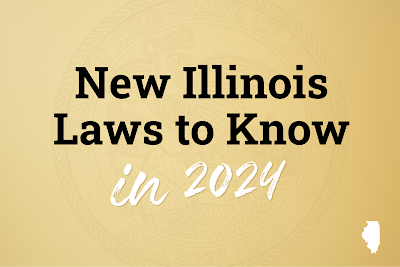New Year’s Day 2024 will ring in more than 300 new state laws, Rep. Frese said today.
“Changes families will see on January 1 include an increase in Illinois’ minimum wage, new restrictions on teleconferencing while driving, and vaping,” Rep. Frese said. “Gun owners also need to be aware that New Year’s Day is the deadline for registering firearms and ammunition under the Democrats’ gun ban passed last year.”
Despite ongoing legal challenges to the Illinois Democrats’ new gun ban and registration law, the law’s January 1 deadline remains in place for gun owners to register firearms and ammunition they currently own that are listed under the law. The Illinois State Police has been tasked with creating rules for the registration process and have provided registration information here.
Rep. Frese noted that the minimum wage in Illinois is also increasing on January 1. In 2023, the minimum wage for non-tipped Illinois workers has been $13.00 per hour. On New Year’s Day, it will automatically increase to $14.00 per hour. The minimum wage for tipped employees will go up from $7.80/hour to $8.40/hour. These increases are mandated by a schedule enacted within the Illinois Minimum Wage Law.
Other new laws you should know about include:
- Drivers will be prohibited from video conferencing while behind the wheel (HB 2431).
- Electronic cigarettes and vapes will be prohibited in public places and near building entrances (HB 1540).
- Utility companies will be prohibited from cutting off electric or gas service to residential customers when the temperature reaches 90 degrees (HB 1541).
- All new single and multi-family homes must include electric vehicle-capable parking, including the electric panel capacity and conduit needed for charging (SB 40).
- Children testifying in abuse cases will not have to confront their abusers in open court (HB 2607).
- Pharmacies and retail stores will be permitted to sell fentanyl test strips over the counter (HB3203), and schools will be required to have an opioid antagonist in secure locations where an opioid overdose may occur (HB 3428).
“Some of these new laws represent positive changes, but there were so many serious problems left unaddressed by the Democrat majority and the governor; chief among them is the increase in crime in our communities fueled by their so-called Safe-T-Act,” Rep. Frese said. “We are also left with tough decisions on where to cut spending in 2024. The budget passed by the majority this past spring creates new, permanent programs paid for with temporary income. This path is not sustainable, and there are no more pandemic relief funds to bail the Democrats out. We must change course in 2024.”
